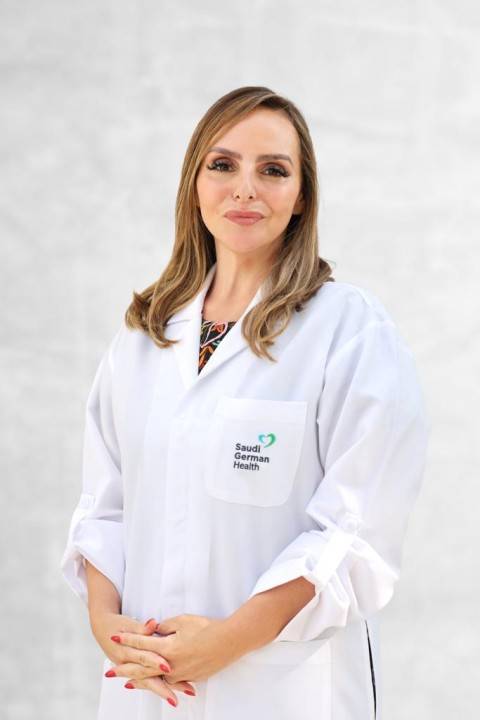Dr Rachel Kaminski is a Pulmonologist at Saudi German Hospital Dubai, specialising in the management of severe asthma, COPD, bronchiectasis, and other respiratory diseases. She trained at Imperial College London and completed her specialist training in respiratory medicine at the prestigious Royal Brompton Hospital in London.
Dr Rachel sits on multiple specialist advisory boards and regularly speaks, locally and internationally, as an expert on airway disease. She is Principal investigator on several international research studies and has recently published in the Lancet. Dr Rachel is also passionate about raising awareness and promoting education in the field of Respiratory Medicine.
At Allocation Assist, we always like to keep in touch with our doctors. Dr Rachel relocated to Dubai in July 2023, and we have been impressed by how quickly she has built up her patient base and taken on various teaching, speaking, and clinical governance roles here in Dubai.
Dr Rachel, can you start by telling us a bit about your background and why you became a doctor?
I was born and grew up in London, with my Egyptian father, English mother, and elder brother. It was a fairly modest upbringing and there was no big expectation for me to go to university. There were no doctors in our family, and as a young child, I was interested in drama and acting. Things changed when I was 11 years old. My father had a sudden, massive heart attack while we were watching my brother at a school concert. He was airlifted to hospital while my brother and I were looked after by some teachers.
Thankfully, he survived, but it was obviously an overwhelming experience for me. seeking to understand everything about what had happened, why it occurred, and how it could be prevented. I wanted to go to all my dad’s hospital appointments. I was in awe of the doctors who had given me my dad back, and this inspired me to do medicine so that I could make a difference in others’ lives.
This motivated me to work really hard at school and I obtained a scholarship to a very good school in London. In those days, it was difficult to get work experience without connections but a friend’s father, who was a general practitioner, allowed me to come and observe in his medical practice. and also did research projects in my summer holidays when I was about 14 or 15 years old.
I did well in my GCSE & A levels and received offers at all the medical schools I applied to. As I choose Imperial College London, as it is not only a great university, but the training is very hands-on and diverse. I did my clinical placements in Chelsea and Westminster Hospital, which is very prestigious, and St Mary’s Hospital in a less prosperous area of London, where I saw a wide range of patients from different backgrounds, as well as other hospitals in London.
Why did you choose to specialise in Respiratory medicine, and how did you find the training?
From early on in my medical training, I knew that I wanted to do Respiratory Medicine. Breathing is fundamental to life and I thought, “What better way to be of service in life than to help people breathe.” There was the option to take a year out from my medical degree to do an additional bachelor’s degree, so I chose to do a BSc in respiratory medicine at the Royal Brompton Hospital, which is internationally renowned for research and treatment for heart and lung diseases. Following my graduation, I also did my specialist training at the Royal Brompton.
I trained under some of the pioneers of Respiratory Medicine, such as Professor Margaret Hodson and Professor Andrew Menzies-Gow. I received amazing mentorship and training, which has stood me in good stead for my specialist practice. It was challenging to have 2 children during my specialist training. It was unusual for female specialist registrars to have children during training and there was no option to come back less than full-time, but things were starting to change in terms of the support available.
So, I went back full-time after my maternity leave, when I had both my first and second child. I am grateful for the support of my husband and extended family, who I couldn’t have managed without.
How was your experience working during the COVID-19 pandemic?
I completed my specialist training in 2018, so I was a consultant for just over a year when the pandemic hit. Our hospital was particularly busy, as it was close to the Cheltenham Races, where there had been a lot of spread of COVID-19 at a horseracing festival in March 2020, just before the first UK lockdown.
I was the youngest consultant on the respiratory team and the only female. It was a steep learning curve, having to take on extra responsibilities and make difficult decisions related to COVID-19. In the early days, we were making ventilators from CPAP machines. It was a difficult time, and it was either sink or swim.
These kinds of situations can either bring out the best or worst in people, but we all supported each other. We recognised that we each had different skill sets, strengths, and weaknesses and worked as a team. It was at this time that I started doing media interviews for radio, television and newspapers.
The hospital was approached by organizations like the BBC and Financial Times, and they chose me to conduct the interviews due to my prior experience in drama and confidence in front of a camera. I found that I could raise awareness about public health issues and impact many more people in this way.
You have excellent communication skills. How are you using these skills in your current roles?
Thank you. I enjoy speaking and sharing my knowledge, both for the general public and other healthcare professionals. In the clinic, I like to spend time with patients, explaining the disease process and helping them understand the reasons for recommended treatments and how they work. I also love educating other health professionals.
At the end of October, I gave a presentation to the Emirates Thoracic Society Annual Congress, and I regularly speak at local and international meetings, especially on the topic of severe asthma and biologic therapies. I sit on advisory boards for asthma and COPD. Since coming to Dubai, I have been asked to speak on the topic of asthma for a local radio station. I have realised the value of putting myself forward to educate and raise awareness, as well as being a clinical opinion leader and advocate for advances in my specialty.
Why did you decide to relocate to Dubai?
I enjoyed my clinical work as well as other roles in teaching and research in the UK. I was the lead for a NHS severe asthma service for 5 years, specializing in the management of uncontrolled asthma, including the use of biologic therapies. We had great success rates; by using biologics for the right patients, we were able to reduce exacerbation rates by 85%. However, there were also challenges. Patients often had to wait 6 months for a consultation and then 4 months after that for diagnostic tests.
The winter of 2022 was particularly difficult, with ambulances queuing up outside the hospital and some elderly patients being treated in corridors, as well as ongoing junior doctors’ strikes. I felt that, despite my best efforts and no matter how many extra hours I put in, I was unable to give my patients the level of care that I wanted to.
We had a holiday in Dubai and got talking to a doctor at the next table at a restaurant, who started us thinking about moving here. So, I contacted Allocation Assist to find out more. We weren’t sure at first, but we had a few online meetings with Emilie to help us understand the health system in Dubai and the pros and cons of living and working here. She explained that Dubai is not for everyone, but if you come with the right attitude and work hard, you can be successful. As well as professional reasons, we felt that Dubai was a safe place to bring up our children, as the crime rate here is very low and there are great international schools. Dubai is a well-connected central travel hub, so it is easy for people to come here and for us to visit family in the UK.
How have you found the experience of working in Dubai?
At first, I was a bit anxious about leaving the UK, as I wasn’t sure if I would be able to continue my research, teaching, and speaking activities easily. However, I have quickly been able to take on new responsibilities and continue my research and presentations here. Within Saudi-German Hospital, I am involved in medical education, clinical governance, and developing new clinical guidelines with the rest of my department.
Some people have asked me about working as a female doctor here in Dubai. My experience has been very positive, and I have not encountered any limitations. I feel safe, supported, and free to be myself, both in and outside of work.
Obviously, there were some challenges at the beginning, especially getting used to working with insurance providers and the coding system. I had not worked in the private sector before, but I have experienced a lot of benefits, such as being able to spend more time with patients and provide better continuity of care. We have great resources available within the hospital. I am able to get all the required tests done, such as CT, MRI, bronchoscopy, or lung function tests, interpret them, and start treatment very quickly, often within 24 hours. Whereas, in the UK NHS, patients were often waiting weeks or months for necessary tests.
I always strive to do my best for my patients, as I would for a member of my own family. In fact, the motto of Saudi German Hospital is “Caring like family.” I feel supported by my colleagues, and we work in collaboration, benefiting from each other’s skills and experience. I do work hard, but I also gain a lot of benefits, such as improving patient outcomes, making an impact within the hospital and my specialty, and experiencing a great lifestyle here in Dubai.
How have you been able to use your skills and experience at Saudi German Hospital?
I have quickly become very busy, both with clinical and non-clinical work. I have seen a lot of interesting cases with a variety of pathologies. We have international patients from a number of countries coming for specialist opinions. I have been able to continue teaching, and we are setting up Grand Rounds for the whole hospital once a month. Since September 2023, I have been the Medical Director for Interns.
In this role, I am involved in teaching and mentoring around 50 new medical graduates, as well as organising their rotations. I have also been elected to a new hospital committee, through which I can contribute towards driving the hospital’s ambitions for growth and development. In my department, I am seeking to use the skill sets of all members of our team, such as upskilling our nurses, so that they can teach patients inhaler techniques and asthma management plans.
I have seen the benefits of being part of an international group of hospitals. There are plans to travel to different hospitals in the Saudi German Group in Egypt, Oman, and other countries to do specialist asthma clinics and share my skills and experience with colleagues there. We will also have international specialists coming to Dubai. Saudi-German Dubai has ambitious plans for growth and development. It is hoped in the near future that we will become affiliated with one of the top international hospital networks.
The hospital has recently undergone some changes, which have been very positive. The management is supportive of my research, teaching, and speaking at conferences. They see the value of having leaders in various specialties. We are given the maximum amount of leave for education and professional development. I travelled to the European Respiratory Conference in Milan only 6 weeks after starting my new post, as the hospital saw the benefits of me presenting there.
How do you find the lifestyle and bring up a young family in Dubai?
We enjoy living in Dubai. There is lots to do, and the lifestyle is great. I do work hard, and I am quite tired at the end of the day, but I am able to enjoy my free time as we can afford help at home. I can spend quality time with family and friends rather than doing the washing, cleaning, and cooking.
My husband is also very supportive, and we have always shared parenting roles equally. Our children are very happy in an international school. I have made good friends here in a short time. It is fascinating to get to know people from all over the world. I have also appreciated Emilie’s efforts in getting all the doctors recruited through Allocation Assist together for networking and socialising.
Have you experienced any differences in the prevalence and management of asthma between the UK and the UAE?
The prevalence of asthma is generally increasing, and I am seeing a higher prevalence here than in the UK. Some people first experience symptoms after relocating to the UAE. This may be due to exposure to new allergens in the environment, such as dust, in people with a genetic predisposition. Asthma is caused by an overreaction of the immune system to the environment, causing inflammation in the airways. Also, people may not have been exposed to different viruses that may have offered some protective immunity during the COVID-19 precautions and lockdowns.
I also see a lot of patients with previously undiagnosed asthma. They may explain their symptoms as’seasonal asthma’ or ‘winter bronchitis,’ without realising they are experiencing exacerbations of chronic asthma. Another challenge is the inappropriate use of nebulizers and steroids, which act by relaxing smooth muscle or reducing inflammation in the airways.
This kind of treatment may temporarily ease symptoms, but it does nothing to address the root cause of the asthma. Therefore, I explain to my patients that we need to investigate what is causing their asthma. We use various tests, such as allergy testing, blood eosinophil levels, and FeNO (exhaled nitric oxide) testing. Great progress is being made in the management of severe asthma.
We can now stratify a patient’s individual risk factors, as has been done for a long time for cardiac disease, to identify those at higher risk of severe exacerbations. New biologic therapies are also providing life-changing benefits for many patients.
Can you tell us more about biologics for the management of severe asthma?
Yes. We are currently using 5 different approved types of biologic therapies. These are injectable medications that can be used to counteract processes that cause inflammation in the airways, leading to asthma symptoms. They can be used to treat severe allergic asthma, reducing the allergic response, or eosinophilic asthma, caused by high levels of eosinophils (white blood cells) in the airways, causing inflammation.
Biologics can benefit patients with asthma that is not well controlled with other treatments. Once the biological process to be modified is determined, the correct biologic therapy is prescribed. The first injection is given in the hospital, and subsequent doses can be given at home, with the patient monitored for their response to treatment with lung function tests. A course of treatment may last 6 months.
The goal of treatment is to achieve normal lung function, with the patient being able to reduce or stop steroid treatment while remaining free of exacerbations from their asthma. This treatment can be life-changing. We have many patients who are now in asthma remission, allowing them to live a normal life without worrying about asthma attacks or inhalers.
The earlier biologic therapies can be started, the better, to prevent irreversible lung function damage. I have not had problems getting insurance approvals for biologic therapy, as I have been able to demonstrate the evidence base for their use and benefits, both for patient outcomes and cost savings, over the long term.
What advice would you give to a doctor thinking about relocating to the UAE?
The health system is different here, especially if you are relocating from working in a national health system, such as in the UK. The first few months can be challenging, but you need to maintain a good attitude and stay positive. You do have to work hard and promote yourself. While some benefits can come from traditional or social media, I have found that if you do your best for your patients and establish good communication and rapport with them and their families, they will spread the word to others. Dubai enables you and your family to enjoy a good lifestyle. There are opportunities to get involved in teaching and research here. Overall, there are many more benefits than challenges to working in the UAE.



